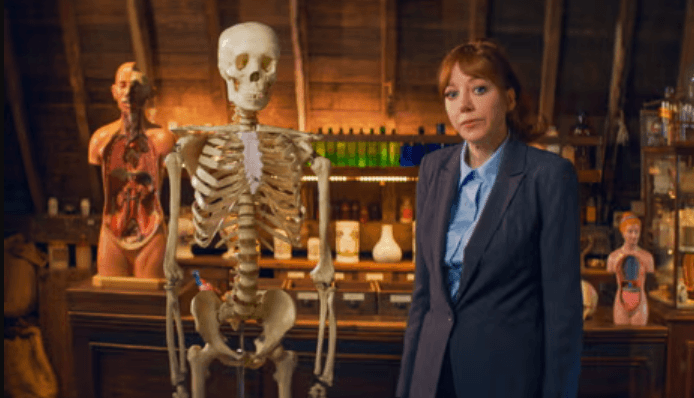Cunk on Life is a mockumentary in which Diane Morgan, acting as Philomena Cunk, asks questions that we all tend to ask at some point in life or around issues that humankind has been fascinated by for thousands of years. But the answers or comments Cunk makes—that’s what makes this show brilliant one!
All those not-naïve remarks she makes with a straight face as she discusses with scholars from different fields of study from some of the most popular institutions give the audience the much-needed break from the mundane, tiring human life and endless responsibilities.
Available on Netflix, directed by Al Campbell, this mockumentary of around 1 hour covers several areas, including the origin of life, the universe, whether God exists, what is the purpose of life, reproduction, spirituality, death, and more. She meets with professors who have spent most of their adult lives dedicated to the subjects they teach and/or do research on, including Professor Jim Al-Khalili, Professor of Quantum Physics, University of Surrey; Brian Cox, Professor of Particle Physics, University of Manchester; Professor Douglas Hedley, Professor of Philosophy of Religion, University of Cambridge; Sir Paul Nurse, Nobel Prize Laureate, Physiology or Medicine; Professor Joyce Harper, Professor of Reproductive Science, University College London, and many others.
When Cunk questions life
While the film indulges us in almost all the common philosophical subjects like whether God exists, did we come from apes, and such, at almost every point of discussion, Cunk comes up with comments, responses, and comebacks you would not expect. For instance, when she asks Professor Hedley, “Why are we here?” as a scholar who has been teaching the philosophy of religion for a long time, he is curious to answer, so he asks her if she means why we are here on Earth. This is the documentary part of the discussion. And Cunk replies that what she meant was why they are seated there is that because the location is close to his home. This is how the documentary turns into a mockumentary as Cunk moves from subject to subject, pretending to be naïve, making parodic comments effortlessly!

How she can connect random things with one another in a way that everyone can relate to but nobody is prepared for only tells us how witty Diane must be to make such connections in the first place, while also keeping the audience engaged. Almost everyone would have their personal favourite lines by the end of the film, whether it be her drawing a connection between DNA and Tom Cruise, calling both of them “tiny, yet complex,” or when she explains that subatomic particles can “simultaneously exist in two different states at once,” like “Liam Hemsworth, who is sexy and boring,” or when she says that God Emperor of Dune asks “profound philosophical questions” like “would you love me if I were a worm?”
When the professor of religion asserts that God exists everywhere, she asks him if he is in the cupboard—a question you can expect from a child but not an adult—and the helpless professor gives an evasive answer similar to what our parents might have told us when we were kids.
Plentiful puns to watch out for in Cunk on Life
For example, when Cunk asks the professor about cell division, if cells always multiply and divide all the time, he says yes and goes on to explain further. There, Cunk remarks that she then understands why she feels worn out all the time. Or when she associates the biological cell with a prison cell, tying the two together and opining that maybe that is why existence is depressing.

Tired and depressed as you probably are, you want to agree. When she says that we wouldn’t be “upstanding citizens” if not for this and points to a model of a human skeleton, you would wonder when was the last time you were one!
Mockery of humanity
There are several moments where you laugh out loud as she moves from subject to subject, finding the perfect comedic thing to say while also hitting the right spot each time. Often, Cunk catches them off guard as she initiates dialogue, asking deep questions, and when they do put in their best efforts to give honest answers, she quickly interrupts them with ridiculous questions that are childish, with a deadpan face. And the comments she makes are ridiculously tangential to the issue being discussed but still align with how someone with a sense of humour might view them. The mockery is too apt for this day and the times we live in to be ignored, so most of us can quickly connect with where she comes from even if we don’t see it coming.
Witty jibes at the world we live in
Cunk also makes witty jibes here and there, reminding us of and ridiculing loudmouths and know-it-alls who would endlessly defend themselves, their ignorance and arrogance, but could never bother to change. Like when she excuses herself for using gender stereotypes, saying that the gender bias is probably in her DNA, so it’s not her fault. Or like when she takes a jab at the modern-day dating world and dating apps, contrasting female genitals with male genitals, saying that female genitals are usually more private and behind a paywall, while male genitals are more easily exposed and can be easily photographed and DM-ed to a potential mate. Or like when she discusses paintings from the times of war, death, and what happens after we die, suggesting that ghosts must be real because they have been caught on camera so many times, like in Poltergeist. None of this is new for someone active on the internet and social media.
Whose side are you on—the ignorant loudmouth or the irritated scientist?
When she pushes these scientists and experts with intentionally dim-witted questions, some of them are a little shocked, some just seem to laugh gently because they don’t know what else to do when asked such questions while filming their answers, and some just can’t take it. When she tells a professor of quantum physics that she would like to move on to hardcore, scientific stuff and then proceeds to ask whether the ghost comes out of the human body after death out of the “north or the south hole,” his expressions alone give the audience so much amusement, as he struggles to stay calm and keep the conversation going.
Cunk effectively capitalises on his hidden but visible irritation, pushing him further and adding another pun to the equation as she uses ghosting in the dating world to prove that ghosts must be real!
Not just brilliant but also brutal and bold
When she discusses with Professor Joyce Harper how reproduction happens following intercourse, this part is like a sandwich layered with multiple jokes, but it is not only funny; there is more to it. Cunk makes comments you can’t ignore about the politics around a woman’s body and women’s right to make their personal choices. Most of these jokes around dating and reproduction are what straight women from across the world can instantly agree with and laugh at!

When she criticises writers and artists, like Sartre and Vincent Van Gogh, whose works have been lauded and appreciated for centuries, that part of you that was forced to study history, literature, and arts you never liked feels liberated through laughter. When she blatantly proves her point that some forms of work can never be rewarding, no matter how much you wish it were, she nails it, but in a hilariously bold manner.
In the name of exploring complicated subjects around human life, morality, consciousness, the universe, and science, Diane Morgan plays with words, calls out human unintelligence, which often goes hand in hand with arrogance in the name of “free speech,” and shows how the intelligent can be easily made to either doubt themselves or not talk anymore, while a fool can keep it going on and on with their confidence only growing stronger with time!
About the author(s)
Lakshmi Prakash is a data scientist. She sees practicing equality, humanity, and science as the only possible path to a progressive future and holds that the absence of any one of these will negate any growth in other areas. Her hobbies include reading fiction and non-fiction, learning something new, brisk-walking, cycling, and writing a chapter only to forget where she saved it.




